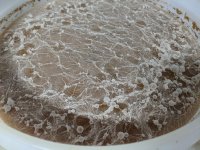Tall_Yotie
Well-Known Member
Been brewing for 15+ years, and this is a first for me, though I have seen it posted many times.
Following an old distilling recipe to see what it made; boiled water, dissolved sugar, poured into (sanitized) bucket. Added cool water, then put in sweet feed (corn, oats, wheat, and molasses blend for horses). Added yeast. Let it ferment on the grains. Smelled fine, did its thing, slowly fermenting away.
Week and a half later, this is what I have:

White film with small spherical bubbles captured. Looks pretty. Smells like someone's early attempt at a sour (little cidery, but prob due to age). Very pretty.
Is this a lacto infection? If so, do I just let it do its thing, I just sample it until it is at the right funk then transfer and crash it, or are there any concerns I should have?
I'd taste it, but not wanting to get into that sort of science experiment right before work!
Following an old distilling recipe to see what it made; boiled water, dissolved sugar, poured into (sanitized) bucket. Added cool water, then put in sweet feed (corn, oats, wheat, and molasses blend for horses). Added yeast. Let it ferment on the grains. Smelled fine, did its thing, slowly fermenting away.
Week and a half later, this is what I have:

White film with small spherical bubbles captured. Looks pretty. Smells like someone's early attempt at a sour (little cidery, but prob due to age). Very pretty.
Is this a lacto infection? If so, do I just let it do its thing, I just sample it until it is at the right funk then transfer and crash it, or are there any concerns I should have?
I'd taste it, but not wanting to get into that sort of science experiment right before work!

